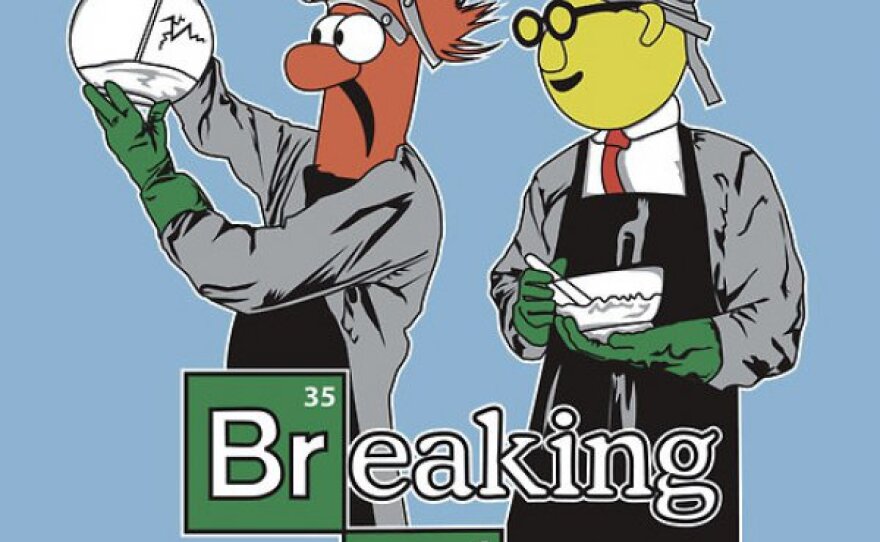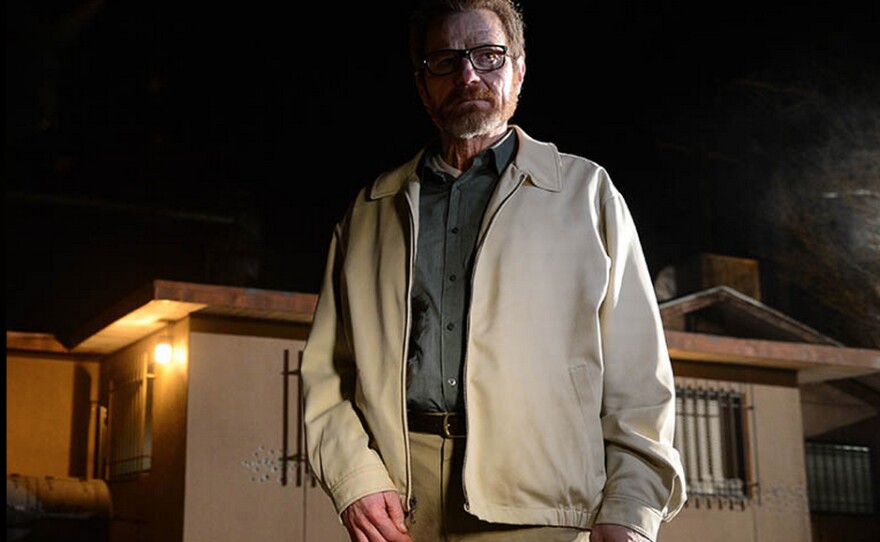One of the best shows ever to grace television ended last night, it’s sad to say good-bye to “Breaking Bad.” (Spoilers will ensue.)
I came to “Breaking Bad” late, as it was starting its third season. I had been burned by shows before. Critics and friends would tell me how great something was but after a few episodes, disappointment would lead me to abandoning the show (“The Walking Dead” is key among these). But once I sampled my first episode of “Breaking Bad,” I was hooked. In fact I binge-watched the first season in about two nights and the second season in a few weeks. The show was the most cinematic on television. The writing was sharp, the acting spot on, the cinematography inspired, the editing tense, and the story and character arcs were well thought through and detailed. All in all a spellbinding show.
The story in brief deals with high school chemistry teacher Walter White (the brilliantly cast Bryan Cranston) who is diagnosed with cancer on his 50th birthday. When he discovers that his health insurance falls woefully short of what he’ll need, he ends up putting his chemistry knowledge to work manufacturing what becomes the highest quality meth to hit the Southwest. With the help of his former student and junkie Jesse (Aaron Paul), he rises from teacher to murderous drug manufacturer, all in less than two years.

Initially, the show hooked me because of the radical transformation of Walter White from dutiful high school teacher to drug dealer and cold-blooded killer. Underlying that appeal was the biting irony (summed up perfectly in this comic) that Walt would not have been provoked to a life of crime if his health insurance just covered his illness rather than making him feel that he’d have to bankrupt his family if he tried to pursue treatment. But what was also clear early on was that the show was concerned with the notion of consequences, and not merely moral consequences. The best example of this occurs when Walt allows Jesse’s drug addict girlfriend to choke on her own vomit after a drug overdose. She is the daughter of an air traffic controller who, grieving over his daughter’s death, makes a mistake on the job that causes an airplane to crash. Walt’s single action leads to the death of more than 150 innocent people. That’s a dramatic way to make a point about how interconnected we are and how our actions can have repercussions far greater than we can imagine. But show creator Vince Gilligan never placed a moral judgment on those actions. Most people read their own moral values on Walt’s actions but the show never really did, it left it up to us to pass judgment.
That season the show revealed its attention to detail by having the titles of the four episodes with the teddy bear floating in Walt’s pool combining to read: “737 Down Over ABQ.” 737 being the flight number of the plane that crashes at the end of season two. It’s satisfying to know that the people running the show are thinking ahead.
The third to the last episode of “Breaking Bad” took the title of Shelley’s poem “Ozymandias,” a bit obscure to some but rich for others. One section of the poem reads:
"My name is Ozymandias, king of kings:
Look on my works, ye Mighty, and despair!"
Nothing beside remains. Round the decay
Of that colossal wreck, boundless and bare
The lone and level sands stretch far away
Created by Vince Gilligan (formerly of “The X-Files”), the show riffed on the western genre in its themes and locale, and on Italian spaghetti westerns for their sense of the human face set against the wide-open landscape. The show took us to some dark places, displayed wicked humor, and managed to rivet us to our seats week after week and then left us salivating for more during the off season. Something that good needs to be savored and appreciated. I felt the same way with season 4 of “Dexter” (featuring John Lithgow).

Yesterday the series finally drew to a close with a record 10.3 million viewers. The much-anticipated finale delivered a neat yet still satisfying resolution. It was a fitting and logical end. Walt had passed the point of no return – his family had rejected him, the police were after him, the only people who would help were those he paid to do so – he could not atone for his sins but he could at least acknowledge them and take responsibility for them. But he got to do it on his own terms, something he succeeded in doing throughout the whole show. To some that might seems too easy, that Walt got off too light. But the disappointment comes if you are expecting a moral ending with a conventional sense of punishment.
This raises a question about what the show is really about – does it promote a conservative agenda, is it about the failed American Dream, does it say anything about the drug war? In the end for me what “Breaking Bad” delivered was a portrait of America and a distinctly American sense of identity. By tapping into the western genre, the show starts with something quintessentially American. That genre is prone to celebrate the individual over the community or the greater good. The western hero is frequently the loner who follows his own path – think of John Wayne at the end of “The Searchers,” “Shane,” or Clint Eastwood in some of his spaghetti westerns.
What sets “Breaking Bad” in motion, as I pointed out earlier, is our particular kind of health care system. That’s distinctly American, and so too is Walt’s response. He follows the American notion that you don’t take help from others but rather pull yourself up by your own bootstraps. That tends to be a conservative perspective and the show again milks some delicious irony from the fallout of Walt’s decision to get out of his economic crisis by manufacturing meth.
But even more noteworthy is that at the end, Walt confesses that he did not do everything for his family as he was prone to proclaim, but rather he did it for himself. This may be the single most revealing line in the series. That selfishness, that sense of ego is also quite American. He did it for himself, because it made him – in the face of death – feel alive, because he not just made meth but made the best meth. There’s that American pride even if it is misplaced. Walt at the beginning of the series was a man who felt slighted, who felt his worth and intelligence were not recognized. He felt like he was the smartest person in the room and no one was acknowledging that. Becoming Heisenberg (taking the name of Nobel prize winning German physicist Werner Heisenberg) was his way of flipping those people off and saying, “See, you underestimated me and you were wrong and now you’ll pay the price.”

One of the things the show did for me was that it made me identify with Walt. I know that’s not a good thing. When it came to that show, my moral compass became totally screwed. I identified with Walt’s frustration and I wanted to feel that I too could change my circumstances if I just put my mind to it. On some perverse level I wanted Walt to prove he was right, and to get away with what he did, or do, as the show allowed him to do, to go out on his own terms because that was satisfying.
Now in the real world, I would never feel that way. Anyone who had committed the crimes he had would not merit my sympathy. So how did “Breaking Bad” cast this spell on me? Well to begin with there’s Cranston, who brought Walt to life with such passion and ferocity that he was always the most fascinating character on screen at any given time. And second, it tapped into that very American and very empowering sense of the individual, and the sense that we control our own fate, that solutions reside in ourselves not in anything external.
“Breaking Bad” is a great show not because it was socially conscious or far thinking or deeply compassionate or grittily real, it’s great because like Walt it is precisely focused on a single goal. In creating a portrait of a single individual, it captures and defines something American. It’s not an always flattering portrait but it’s riveting in its detail. Like Walt, I appreciate something that's perfect or close to perfect regardless of what it is. Some may want "Breaking Bad" to say more or to be deeper, but I appreciate it for just being a superbly crafted show.
The final episode of “Breaking Bad” took the title of “Felina.” It’s an anagram of “Finale,” it refers to the name of a character in the song that plays in Walt’s car, and it’s a combination of the periodic symbols for iron, lithium, and sodium. The “Breaking Bad” Wiki states: “’Fe’ is the symbol for iron, the dominant chemical in blood. ‘Li’ is the symbol for lithium, the most common metal used in manufacturing methamphetamine, and ‘Na’ is the symbol for sodium, a major element in human tears.” Hmm? “Blood, Meth, and Tears” or maybe “Family, Crime, and Compassion.” Three elements that are impossible to combine without disastrous results. But brilliant when creatively combined for a series about one man asserting his sense of self and then accepting responsibility for what that means.
Now I need to find something new to hold me rapt and make me want to plan my week around each new episode... and that's going to be mighty hard to do.
Companion viewing: “Malcolm in the Middle,” “Drive,” “The X-Files” (specifically the Jose Chung episodes)






